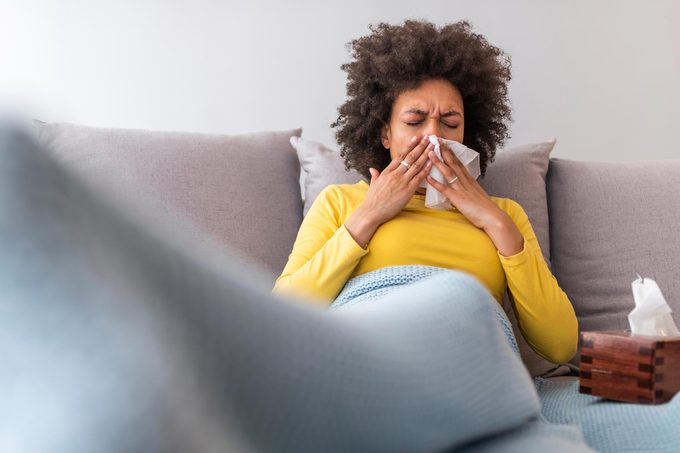Is It Too Late to Get a Flu Shot?
Updated: Dec. 15, 2020
Haven't had time to get a flu shot? It might not be too late.
Flu season is here with a vengeance, but there’s still time to get your annual flu shot if you haven’t already.
“It’s late—but not too late,” says William Schaffner, MD, an infectious diseases specialist at Vanderbilt University Medical Center in Nashville, Tennessee. Just don’t delay much longer, he warns. The 2019-2020 flu season is a vigorous one with more illnesses likely and it takes a week to two weeks to build up protection to the virus after vaccination.
The flu virus circulates year-round but flu season in North America typically begins around October and peaks between December and February; the timing varies each season, according to the Centers for Disease Control and Prevention (CDC). It’s not unheard of for flu cases to appear as late as May.
Is it ever too late to get a flu shot?

Technically, no, though there are definitely better and optimal times. “You can vaccinate any time of year [but] ideally, it happens in the fall,” says Robert Glatter, MD, an emergency physician with Lenox Hill Hospital in New York City. That gives your body enough time to develop antibodies before the worst part of the season kicks in.
After February or March, when the season typically wanes, the flu shot may still be a good idea for people who are at high-risk, says Joseph McBride, MD, an infectious diseases specialist at the University of Wisconsin Health in Madison. This could include people with weakened immune systems. (Read about common misconceptions about the flu shot.)
I’ve already been sick—do I still need a shot?

Yes, and there are two reasons for this. One is that Americans are notoriously bad at self-diagnosing influenza, says Dr. McBride. What you think is the flu may well have been a bad cold, which means you haven’t developed antibodies to the actual flu.
The second reason is that there are at least two major strains circulating this year. “We’ve picked up information in our surveillance system that an occasional poor soul has had one kind, recovered and then gotten another one,” says Dr. Schaffner. “That’s not common, but when you have two sequential dominant strains it’s going to be more common than it has been in the past.”
Getting a flu shot even after you’ve been sick may protect you from getting sick again. Flu shots can also lessen the severity of an illness. Here’s what to do if you do get sick.
Can I get a flu shot too early?
The strains of the influenza virus that circulate are constantly changing, which means the vaccines have to be reformulated each year. “Flu viruses are updated each season,” says Libby Richards, PhD, RN, associate professor at Purdue University School of Nursing in West Lafayette, Indiana.
That means this year’s shot won’t protect you against next year’s flu. You can get a flu shot in May or even June if you want—it won’t hurt—but it’ll still be last year’s shot and it won’t help you when flu season rolls around again.
How effective is the flu shot?
The effectiveness of the flu shot varies a little each year as specialists try to predict which strains will be circulating in North America based on what’s happening in the southern hemisphere. The predictions are never perfect, but some years are better than others. “In general the flu vaccine reduces the odds of getting the flu by about 60 percent,” says Dr. Glatter. Some seasons’ shots—like last year’s—miss the mark: The shot was only about 29 percent effective and that resulted in many more sick people, and a lot more serious illnesses. However, the vaccine is the best protection we have; if you don’t like needles, consider the nasal spray, or look at ways to make the shot less painful. Note that the nasal flu vaccine is only recommended for people 2 to 49 years old and not for people who are pregnant or who have weak immune systems, per the CDC.
Can kids get a flu shot?
The CDC recommends that everyone aged six months and older get any of the licensed influenza vaccines. This year it may be doubly important for children and teens to get the vaccine as more kids seem to be falling ill, says Dr. Glatter. Children and teens are also experiencing a higher rate of secondary infections like pneumonia. This age group is particularly at risk for influenza B, which is circulating this year. “Generally adults have better immunity from being exposed in the past,” he says. Influenza B is more stable than type A and the virus experiences fewer mutations from year to year.
Does the vaccine lose effectiveness over time?
Each year’s flu shot usually becomes available towards the end of the summer, but that doesn’t mean you need to race out to get one right away. The optimal time to get a shot is late September into October, says Dr. Schaffner. If you’re a healthy 22-year-old with a perfect immune system, that should give you strong protection throughout the season.
But there is some debate about how long the vaccine’s protection lasts for older people and people who are frail, says Dr. Schaffner. “I would not recommend getting a flu vaccine in August,” he says. According to CDC researchers, a vaccination in July or August may not protect you throughout the flu season—especially if you are an older adult. That’s why Richards counsels patience when getting the shot: “It’s a once a year type thing, which makes it a good reason to wait until September or early October to get vaccinated.”
There may be one exception to this rule. Children under the age of eight who are getting the flu vaccine for the first time need two doses separated by a month. For them, getting the first installment in August is reasonable, says Dr. Schaffner.
Where can I get a flu shot?
Flu shots are widely available at pharmacies, grocery stores, urgent-care clinics, and doctors’ offices, says Richards. The CDC has a flu vaccine finder to help you find the location nearest you. So far, there seems to be enough vaccine to go around; however, supplies can run low and that’s another reason not to put off vaccination any longer. “I wouldn’t say there’s a sense of urgency, but it’s not unlimited,” says Richards. “Manufacturers don’t want to produce more than will be used so now’s a great time to get it because we haven’t heard of shortages yet.” If you’re looking to get one at a local pharmacy or store, here’s where you can get a flu shot.
What else can I do to prevent getting the flu?
Wash your hands frequently with soap and water for at least 20 seconds each time, advises Dr. Glatter. And keep surfaces clean by wiping them down periodically, says Richards. “The flu virus can live on hard surfaces for 24 hours,” she says. Also avoid crowds, stay home when you feel sick, and don’t go back to school or work until you’ve been free of fever for 24 hours without any medications. Here are some other ways to prepare for flu season.















